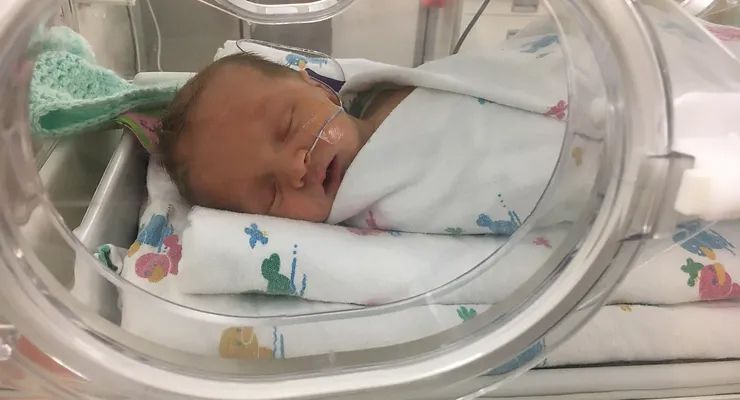Henry's Story
Early Days
Henry was born three weeks early on January 17, 2020. We were delighted to hear his cry, though we quickly knew something was wrong as the room hushed. We did not know it at the time, but Henry was experiencing his first symptoms of AHC, as upon the transition of entering the world, Henry needed some additional breathing support. Later, during his first day of life, Henry had more difficulty breathing and turned blue, and at times held a fixed stare. His team felt it best to transfer us to the closest children's hospital so Henry could be admitted to the NICU for further observation for breathing issues and suspected seizures.
After a week in the NICU with many tests including EEGs, MRIs, and infectious workups, we were told that nothing abnormal was found and Henry was ready to go home. We spent four glorious weeks at home with Henry, enjoying his every new facial expression and many snuggles before our current journey began.
At five weeks old when Henry’s mom Mary took him out of the bath, he became stiff and seemed to go unconscious. This episode lasted for one terrifyingly long minute before Henry returned to himself, but we knew something was not right. Three days later, we put Henry down under his playmate and he went into his first tonic clonic seizure as his right side got stiff, his arm began jerking, his eyes were fixed, and his tongue began to thrust. This seizure lasted nearly 15 minutes and we rushed him to the hospital.
After an EEG confirmed Henry did indeed suffer a seizure, we started what would be the first of many antiepileptic drugs and we were given the diagnosis of benign epilepsy of infancy. We were devastated that seizures were now a part of our lives, but hopeful that he would grow out of them. We went home armed with a rescue plan and rescue meds.
A few days later, Henry had another seizure and we used our rescue plan for the first time and went back to the hospital. We left with an increased dose of medicine and were told that it can take a bit for a drug to get to a therapeutic level. A few days later, he seized again. This time, we added another drug to his regimen in the hopes it would work better.
A few more days later, around 7 weeks old, Henry had yet another seizure. This time, his neurologist suspected the cause was genetic as the pattern of seizure activity had shifted sides in Henry’s brain. We took a blood sample for genetic testing and we were told it could be 12 weeks until we got a result.
Ten days later, when Henry was 9 weeks old, his neurologist called. The results came back, abnormal. We knew the cause as he had a genetic mutation in his ATP1A3 gene. We didn’t know for sure what this meant for Henry yet, as he hasn’t presented with any other symptoms besides seizures. Our neurologist told us time, and Henry, would tell us what this abnormality meant for his life.


